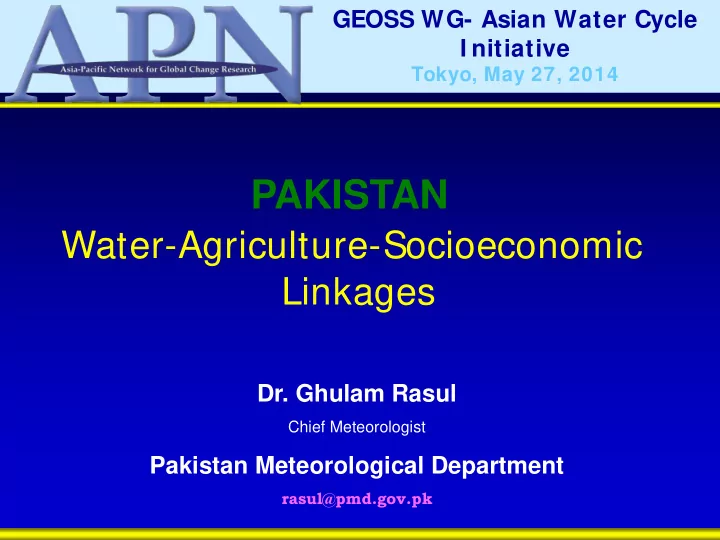

GEOSS WG- Asian Water Cycle I nitiative Tokyo, May 27, 2014 PAKISTAN Water-Agriculture-Socioeconomic Linkages Dr. Ghulam Rasul Chief Meteorologist Pakistan Meteorological Department rasul@pmd.gov.pk
AFGHANISTAN INDUS PAKISTAN INDIA
I ndus River Basin: Water scarcity: a frightening perspectiv ? ? ?
Too Much Water and Too Little Water o Cloudburst Events 2001, 2003, 2007, 2008, 2009, 2010, 2011, 2012 o Prolonged Drought 1999-2002 o Historic River Flooding 2010, 2011, 2012 o Tropical Cyclones 1999,2007,2009,2010, 2011, 2012 o Snow melt flooding 2005, 2007 and 2010 o Drought at sow ing stage 2009, 2010, 2011 o Abnormally w et April-May resulted into crop damage
Major Issues Highly variable river flows-high flows in July, August and very low in the rest of year Vulnerability to floods, drought and GLOF Highly topographic heterogeneity and remoteness making in-situ measurement difficult Degrading water quality due to exploitation of groundwater, effluent from agriculture and industries Arid coastal strips and mangrove areas are under increased environmental stress from reduced fresh water flows Lacking in adaptive capacity of Institutions and Individuals
International Projects 1. Impact of Climate Change on Melting Glaciers and Water Cycle Variability in Asian River Basin. Funding Agency – APN 2. Application of WEB-DHMS to Flood and Drought Pakistan Basins in UIB. Supported by: APN-UT-AWCI 3. Differentiation of solid and Liquid Precipitation in Upper Indus Basin (UIB) for Hydrological Models. Funding Agency: DFID 4. Strengthening Flood Forecasting Capabilities in Pakistan. Funding Agency: UNESCO 5. Climate Change adaptation in water and agriculture: IDRC and DFID funding 6. Early Warning System for Glacial Lake Outburst Floods (GLOF) in UIB. Funding Agency: UNDP 7. Establishment of Flash Flood Guiding System. Funding Agency: USAID 8. Demonstration of adaptation technologies at watershed scale. USAID funding
APN PROJECT-CBA2012-03NMY-RASUL I mpact of Climate Change on Glacier Melting and Water Cycle Variability in Asian River Basins To improve climate change assessment and downscaling techniques; Building the capacity of member countries for climate projections; Training of professionals to apply WEB-DHM-S (Hydrological Model); Assessment of glacier melt and hydrological regime shift in the light of climate change scenarios; Assessment of water cycle variability and development of drought early warning system.
APN Project Activities
Future Temperature Projections for Pakistan
Future Rainfall Projections for Pakistan
Projections of Climate I mpacts on Wheat Yield - Best Calibrated Mean yield changes (%) from 20 GCM-based scenarios (top) mean-only “delta” scenarios, and (bottom) scenarios including both mean and variability changes.
Changes in Agroclimatic Matrix Minimum Maximum Minimum Maximum Mean Rainfall Mean Rainfall Temperature Temperature Nankana Temperature Temperature Sialkot Baseline 0.43 -0.20 -0.39 Baseline 0.64 0.004 -0.48 Yield Yield 0.29 -0.46 -0.47 Future Yield 0.73 0.02 -0.57 Future Yield Minimum Maximum Minimum Maximum Mean Rainfall Mean Rainfall Temperature Temperature Temperature Temperature Hafizabad Sheikhupura Baseline Baseline 0.26 -0.26 -0.35 -0.14 -0.37 -0.08 Yield Yield 0.22 -0.52 -0.39 0.20 -0.32 -0.32 Future Yield Future Yield Minimum Maximum Mean Rainfall Temperature Temperature Gujranwala Baseline -0.05 0.24 0.14 Yield -0.06 -0.02 0.01 Future Yield Change e in Pea earso son’s s correl elat ion (r) bet et w een een Whea eat yiel elds s (DSSAT) and grow ing sea seaso son m ea ean clim at e e m et et rics s in t he e basel seline e clim at e e (t op) and in t he e RCP8. 8.5 5 Mid-Cen ent ury fut ure e clim at e e sc scen enarios s (bot t om )
Solution to the Problem • A Comprehensive adaptation package was developed by combining • Bio-physical factors • Policy change • Socio-economic factors • Information Technology and others
Adaptation Package • Increase in planting density (15-25 % ) • Early sowing / transplantation • Reduction in irrigation (15-25% ) • High yielding cultivars under stressed climatic conditions • Supportive input/output price policy • Off-farm income opportunities
Adaptation I mpacts • About 84 percent farm households would adopt the package due to increase in net farm income • Significant reduction in poverty among farm households • I mprovement in the livelihood due to increase in farm income
After Before Adaptations Adaptations Gainers Adopter Losses (Rs) 26% s 84% 0 Losers Non adopters 74% 16% Farm Population (%)
Create awareness among the common farmer Need for effective adaptation policy
Climate Smart Technologies like Efficient I rrigation Systems and change in cropping pattern etc. Comprehensive research programs to address the climate change and climate variability to ensure food security and efficient resource management
Roles & Responsibilities Farming Community Government • Actions • Strengthen the Institutions • Adjustments • Policy Support • Management • Infrastructure Development Responsibilities Society Global Partnership • Awareness • Sharing the Ideas • Public-private partnership • Bearing the responsibilities • Capacity Building • Trade
Lead Local Organizations 1. Pakistan Meteorological Department (PMD), Islamabad 2. Pakistan Agricultural Research Council (PARC), Islamabad 3. University of Agriculture Faisalabad (UAF) 4. Water and Power Development Authority (WAPDA), Lahore 5. Global Change Impact Studies Center (GCISC), Islamabad 6. National University of Science and Technology (NUST), Islamabad 7. Foreman Christian College Charted (FCC) University, Lahore International Organizations 1. University of Tokyo-Japan 2. ICIMOD-Nepal 3. Colorado University-USA 4. BIOFORSK - Norway
Recommend
More recommend